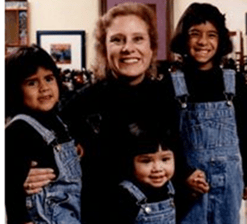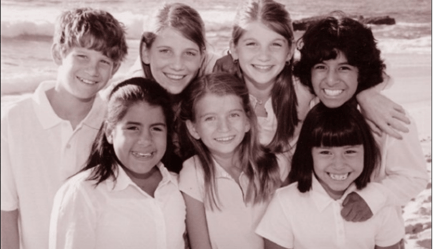A Personal Reflection - Forever Grateful
My sister set the phone down, staring blankly. "It's back. Everywhere. Terminal. He said three months." Her words gave way to inaudible sobs. "I cannot leave my sweet baby girls. I cannot leave them, Kate." Over and over, heaving with despair. We clung to each other, my heart shattering into a million tiny pieces. It could not possibly be real life.
 Ginny was my older sister. My best friend. The one that made the mundane hilarious. She was the brave mother of three beautiful, adopted daughters, each with a unique birth story peppered with loss and sorrow. To think my precious nieces would lose their loving momma, their only parent, was altogether too painful to bear.
Ginny was my older sister. My best friend. The one that made the mundane hilarious. She was the brave mother of three beautiful, adopted daughters, each with a unique birth story peppered with loss and sorrow. To think my precious nieces would lose their loving momma, their only parent, was altogether too painful to bear.
Her death left a giant hole in our hearts.
My husband and I adopted her three beloved daughters. Our family of six became nine. Cousins became siblings. Two households became one. We muddled our way through our enormous grief, doing the best we could to comfort each other through the deep, deep sadness. Gin had been larger than life, making each of us feel like we were the only person in the room that mattered. When we lost her light, our days felt so much darker.
But we were not alone. Our lifeline during those first two years was powered by people …. grandparents, siblings, neighbors, teachers and friends. They poured love and care into each of us. Not just occasionally, but day in and day out. Even when I insisted that we were okay, this army of caring friends and family were unyielding in their support. They showed up, and it mattered. In a big way. It made a ginormous difference. It wasn’t just the lasagnas that were dropped off at the door, or the carpool rides that were magically arranged. It was being lifted up each day…in the midst of heartbreak…that got us through and helped us heal. Those amazing people know who they are. And for each of them, I am forever grateful.
Pain and hurt manifest in mental health challenges
There is nothing more difficult than watching your child struggle with their mental health - and our seven children, like most, were ill-equipped to manage the difficult and heavy emotions triggered by pain and grief. I tried my best to pour love and care into each of their hurting hearts as inevitably, the trauma of early loss and family change manifested in varying challenges for each of them. But they needed more. As a practicing licensed school counselor and therapist, I was fortunate to have access to tools and resources to help them navigate their individual journeys back to wellness, but the road was not easy or straight. However, there was one constant - their paths toward healing were powered by caring relationships that were encouraging and trusting, providing the regular and frequent accountability they each needed to take small steps toward more healthy ways of thinking and being. Once again, it was people who powered their healing, and for those caring relationships, I am forever grateful.
Paying It Forward
Our journey was not unique. Many students on my school counseling caseload struggled with similar mental health obstacles as they faced uncontrollable challenges that negatively impacted their emotional wellbeing. But most of these students did not have access to the tools, the people, or the resources to get through. I wanted to help. I wanted to be that person – to build a trusted, caring relationship that provided the daily dose of care, skills, and support to help my students re-engage and thrive as others had done for us. I wanted to pay it forward.
But there was only one of me and close to 400 students on my roster, with at least 10-15% of them needing more support than I could give each day. I began searching for courses that would create a structured time and place for students to learn healthy ways of thinking and being. But I came up empty.
A former entrepreneur, I got creative and started using technology – Google documents and Google chat – to deliver strategies and encouragement to a small subset of my caseload that really needed help. My hope was that frequent and shorter–motivational doses of coaching could be a more effective catalyst for change. I squeezed the daily coaching time into the bookends of my workday, crafting caring and personalized messages to each student after they completed a small skill-building lesson.
Within a month’s time, I looked at the students’ progress. Their anxiety was lessened, moods improved, attendance and grades trending upward – reinforcing my belief that showing up each day in frequent, digestible doses did make a difference. But with all that was on my school counseling plate, I could not sustain that level of personal support. And neither could anyone else at school. This fueled my energy to find a scalable solution to create caring relationships that could unlock the power of healing for more students.
The Vision for EmpowerU
From that, EmpowerU was born. A people-powered technology solution that combines mental health and wellness skills with highly personalized 1:1 coaching delivered by caring humans- real people that create psychological safety and unconditional regard for each student. Our data proved that this powerful combination could help students replace their anxiety and depression with resilience and motivation. Our team worked to make the solution efficient and easy-to-implement, so it could easily expand the capacity for school social workers and counselors to support more students, without a heavy lift. As students completed the program, we were dedicated to sharing their stories of healing back with their school support team, celebrating each student's transformation from despair to hope.
Over a decade later, our company vision remains the same, because every student with a mental-health barrier deserves a caring adult in their corner. One who is encouraging them daily to take that next step forward with a new learned skill or strategy– and who is checking in on them regularly to make sure they do. That is what powers change.
The Ripple Effect
There is no doubt all roads have led me to this exact place, at this exact time. My sister was the first pebble in the pond. Her uncanny way of making each of us feel like we mattered started the first ripple of caring support for my family in a time of grief. And that ripple expanded to care for my children when they struggled. And onward to the students on my caseload that needed mental health support. It is amazing to see those small ripples cascading into a waterfall of care to tens of thousands of students across the country with the help of hundreds of heart-centered EmpowerU coaches and innovative school partners. I am grateful for them all.
Gin was a connector and a life force. She often said, “It’s just people talking to people…everyone just wants to feel like they matter.” And she was right.
I miss her every day, but she lives on. And for her inspiration, I am forever grateful.
ABOUT KATIE DORN
Katie Dorn, MA, LSC, MFT is co-founder of EmpowerU and an experienced licensed school counselor and therapist. A mother of seven grown children and a successful entrepreneur and author, Katie is a strategic thinker with an ability to connect and build functional and productive teams. Her passion for finding effective ways to help students and families with mental health obstacles has fueled her work for EmpowerU since 2015.
ABOUT EMPOWERU
EmpowerU’s highly personalized, data-driven Tier 1 and Tier 2 solutions equip students to be resilient, self-directed learners and reach their goals — without additional hires or a heavy lift from schools. The program provides each student with interactive lessons and personalized coaching, pairing technology with brain research in a unique way that supports students, empowers their growth and reduces feelings of anxiety and depression. Multi-year data makes it clear: nobody understands Multi-Tiered System of Supports (MTSS) and approaches student success the way EmpowerU does.

